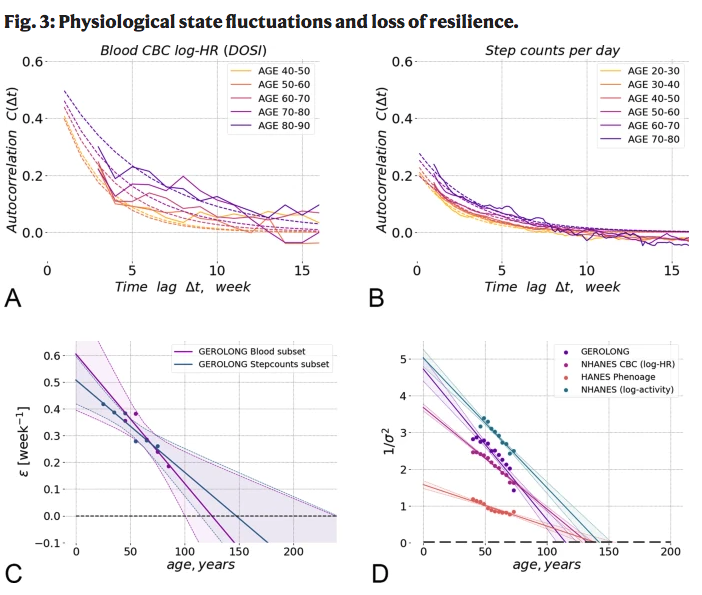- New research indicates the hard limit on human life is 150 years.
- The main factor limiting our lifespan is a loss of the ability to bounce back after a setback, called "physiological resilience."
- Even without major health issues, like cancer, your body will eventually run out of energy to help recover from even minor challenges.
Even if you somehow manage to make it through decades of old age without a single major health issue—evading cancer, heart disease, diabetes, and so on—scientists say there's a ceiling on how long you can extend your life, throwing cold water on the ambitious Silicon Valley goal to outsmart death.
But the thing that's keeping the human body from reaching immortality is surprisingly mundane: over time, your body loses the "physiological resilience," or the ability to bounce back, that you once had in your younger years. That, scientists say in a study published earlier this year in Nature Communications, is enough to limit our lives to 120 to 150 years at the most.
Lead researcher Timothy Pyrkov is part of a Singapore-based biotech company called Gero (yes, the name itself is the prefix meaning "old age"). Gero's stated goal is "hacking complex diseases and aging," setting a clear agenda for the research. For this longitudinal analysis, Gero collaborated with Roswell Park Comprehensive Cancer Center in Buffalo, New York and studied large groups of people in the U.S., U.K., and Russia.
The team broke down all the age groups in detail, differentiating between "early adulthood" (16- to 35-year-olds), "middle ages" (35- to 65-year-olds), and "older ages" (older than 65). Then, they examined both changes in blood cell counts and the number of steps the groups took, treating the two factors as "hallmarks of aging" that could help them chart the subjects' progress (or deterioration) over several months.
Both blood cells and steps might remain constant, the researchers found, if not for periodic interruptions in the form of health setbacks. Specifically, they noticed the problem wasn't some steady decline with age, but instead, a series of step-downs in which the subjects' bodies could not return to their previous level of health.
Let's say when you're younger, your body could normally recover 100 percent from a bad cold, or repair your skin 100 percent of the way after a bad fall. As you age, your ability to claw back to full health may be inhibited to a max of, say, 95 percent. And with more time, that resiliency will only continue to decrease as your body faces repeated obstacles. Basically, it's the opposite of gaining more health in a video game as you progress further—your stamina bar becomes smaller and smaller, even when it's full.
By plotting the "recovery time" for all three age group cohorts over decades' worth of life, the researchers were able to find the point at which the body would ultimately disintegrate as a result of the loss of resiliency. Every year, for example, think of the risk of cancer as a kind of coin toss with a certain likelihood of happening. The longer you live, the more coin flips you must take. The point at which you take that last coin flip, they say, is somewhere between 120 and 150 years—a value that likely puts a hard limit on human life.
"We conclude that the criticality resulting in the end of life is an intrinsic biological property of an organism that is independent of stress factors and signifies a fundamental or absolute limit of human lifespan," the authors note in the paper.
Why study those two variables? Blood cell counts, for their part, have a predictable healthy range that is dependent on your age and gender. Generally speaking, the normal range for red blood cells is between 4.5 to 5.5 million cells per cubic millimeter if you're male, and between 4 to 5 million cells per cubic millimeter if you're female, according to the University of Pittsburgh Medical Center. For white blood cells, the normal range is between 5,000 and 10,000 cells per cubic millimeter. For platelets, the typical range is 140,000 to 400,000 per cubic millimeter.
Deviations from these ranges could signal some kind of disorder. A low red blood cell count, for example, could point to anemia, while a low white blood cell count could mean you have neutropenia, a disease that damages the bone barrow at puts you at increased risk for infections.
Steps taken is a far murkier variable, though, as it's somewhat subjective. The general consensus, and the recommendation from the U.S. Centers for Disease Control and Prevention (CDC), is to aim for 10,000 steps per day. Still, that's highly personal, and the number of steps that a person needs to take to achieve positive health impacts actually declines with age: A 2019 study published in the journal JAMA Internal Medicine showed the more steps a person took, the lower their mortality rate, but the effect leveled off after 7,500 steps per day.
The differences between these two variables make the team's results more interesting. Peter Fedichev—one of the study's coauthors, and a cofounder of Gero—told Scientific American that despite how most biologists would see blood counts and step counts as "pretty different," the sheer fact that both "paint exactly the same future" means the steady decline of physiological resilience is very real.
So, what does it mean to have a hard limit on human life? Without intervention in the form of body part replacements or other supplemental procedures, it means even the most zealous life-extenders can only do so much. And while 120 to 150 years may not sound super long, it's still up to nearly twice the life expectancy of people living today in the U.S.
And considering the late Jeanne Louise Calment—who holds the record for the longest-living person—died at the age of 122 years and 164 days, it seems like they're onto something.
🎥 Now Watch This:

Caroline Delbert is a writer, avid reader, and contributing editor at Pop Mech. She's also an enthusiast of just about everything. Her favorite topics include nuclear energy, cosmology, math of everyday things, and the philosophy of it all.














